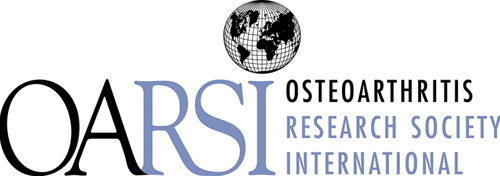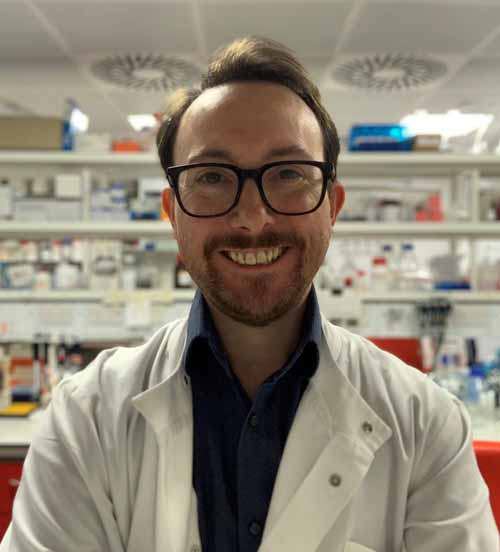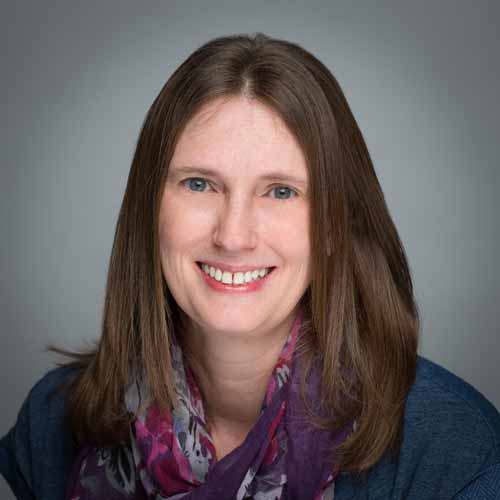Supporting research careers
We're committed to building a world-class workforce to continue the fight against arthritis through supporting research careers and ensuring there's sufficient capacity within the UK to translate ideas into benefit for people with arthritis.
Our success depends on the quality of the scientists and clinicians involved. We aim to support the future leaders of musculoskeletal research by encouraging the brightest and most committed researchers, from all relevant disciplines based in the UK and beyond, to become involved in research in this field.
How do we support musculoskeletal research careers?
We support musculoskeletal research careers through:
- dedicated fellowship support for outstanding researchers at different stages of their career
- funding of researchers through our other funding schemes such as the early career researcher pain awards.
We aim to develop the next-generation of world-class musculoskeletal researchers by providing incentives and motivation during early training and education to make musculoskeletal disease an attractive career choice.
We offer opportunities for early research experience through to advanced research training, with the aim of building a workforce of world-class independent researchers that are supported by universities and other research active institutes.
We provide research training opportunities for individuals with an interest in musculoskeletal diseases. These may be:
- academic clinicians, accepting qualified individuals across all disciplines, including but not limited to rheumatology, orthopaedics and primary care
- allied health professionals, such as physiotherapists, occupational therapists, rheumatology specialist nurses, podiatrists and psychologists
- non-clinical research scientists.
Our strategy is to support training and career development either alone or in partnership with others.
Working in partnership allows us to maximise the impact of our research funding and provide more opportunities to the future leaders in musculoskeletal research. Current partnerships in career support include:
- Academy of Medical Sciences Starter Grant for Clinical Lecturers Scheme
- Medical Research Council/Versus Arthritis Clinician Scientist Fellowship
- NIHR mentorship programme
- Fight for Sight/Versus Arthritis PhD Studentship
Our fellowships are reviewed by our Fellowship Expert Group.
Our annual fellows meeting
The annual Versus Arthritis fellows meeting is a long-standing and highly regarded event in our calendar at which directly funded research students and fellows have an opportunity to attend, present their work and network with their peers.
The focus of this event is to celebrate the research that we fund, support career development through networking, and also to provide us with the opportunity to engage with our research community.
The current format is that of a two-day meeting which takes place in March each year. The agenda is based around poster and oral presentations from students and fellows, who are all expected to give a presentation at our fellows meeting during their award tenure.
As part of the agenda we also invite a high-profile figure from the UK medical research community to present an inspirational talk to the delegates. Previous guest speakers have included:
- Professor Adrian Hayday (King’s College London)
- Professor John Todd (University of Oxford)
- Professor Patrick Maxwell (University of Cambridge)
- Professor Ann Cooke (University of Cambridge)
- Professor Irene Tracey (University of Oxford)
Each year we also include at least one interactive session that is focused on an aspect of career development, such as a structured networking session to allow discussion of issues that early researchers may be facing in their careers. In addition, we invite talks from our fellowship alumni, who discuss their career pathways following the completion of their fellowship with often invaluable advice on the current research funding landscape for our PhD students and fellows. We also take the opportunity to update the attendees on important charitable activities with talks from our various directorates across the charity.
Our fellows meeting serves as an important showcase event demonstrating the breadth and quality of the research that we fund. It also highlights that capacity building and career support is a high priority for the charity and demonstrates our ongoing commitment to support the musculoskeletal research leaders of tomorrow.
Versus Arthritis fellows network
Our fellows network was formed in 2017 to connect current Versus Arthritis fellows and support their career progression.
The network is open to all current foundation, clinical, career development and senior research fellows and is overseen at present by a committee comprised of seven of our current fellows listed below.
The fellows network have established a private online platform where fellows can obtain support and advice from each other via online exchanges, and make new connections to foster collaborative work, grant applications and invited talks. With additional support from the charity, the fellows network organises bespoke training days and events, to directly address specific training needs identified by our fellows at this critical stage in their academic careers.
We believe the benefits of the network are to connect our fellows and provide them with the support, training and resources required to be competitive for further funding applications, senior fellowship bids and tenured lectureships, as well as maximising the opportunities to translate fellows’ research into the clinic and patients’ welfare.
Current Versus Arthritis fellows network committee
- Dr David Wilkinson, Career Development Fellow, University of Liverpool (Co-chair)
- Dr Lucy Norling, Senior Research Fellow, QMUL (co-chair)
- Dr Ghada Alsaleh, Career Development Fellow, University of Oxford
- Dr Charis Pericleous, Career Development Fellow, Imperial College London
- Dr Rebecca Lee, Foundation Fellow, University of Manchester
- Dr Anne Pesenacker, Career Development Fellow, UCL
- Dr Claudia Worth, Clinical Research Fellow, University of Oxford
For more information or to join the network please contact research@versusarthritis.org
Supporting you to involve people with arthritis
Involving people with arthritis in the review of fellowships
Our strategic focus is to put people with arthritis at the centre of everything we do. This includes our research activities. To fulfil our ambitions of embedding meaningful patient and public involvement (PPI) across our research activities as well as our funded research, the research involvement team and patient insight partners have co-delivered training sessions to approximately 300 researchers, helping them understand and better implement PPI in their own work.
More information and resources on PPI can be found on our involvement resources for researchers page.
Assessment of PPI in fellowships
We are beginning to introduce PPI as an additional assessment criteria into our fellowship schemes. This has already been implemented for the current senior research fellowship round where applicants have been asked to include information on how they have involved people with arthritis in developing their application.
In addition to scientific review, applications to the senior research fellowship round will also be reviewed by patient insight partners, who will be represented at shortlisting and interview stages in this round. Patient insight partners will review full applications at the peer review stage and will also be asked to assess the quality of the patient involvement, the relevance to the charity and the potential for patient benefit.
Following completion of the current senior research fellowship round in 2019, we anticipate that PPI assessment will be introduced to our other fellowship schemes. Advanced notification and further guidance will be provided ahead of the opening of each round for individual schemes.
Find out more about our approach to involving people with arthritis for access to resources and support.
Mentorship schemes
Mentoring schemes provide an opportunity for early career researchers to seek advice and support from experienced individuals outside of their immediate supervisory or Principal Investigator's team, to help them develop and enhance their career and personal growth.
Benefits of mentoring include:
- advice and support on career development
- a friendly ear to share frustrations
- opportunity to gain specific skills and knowledge relevant to the mentee's personal goals and ambitions
- expansion of the mentee's professional network.
To help our early career researchers with finding a mentor, we have joined up with a number of organisations offering relevant mentoring schemes, details of which are outlined below.
British Society for Rheumatology (BSR) researchers mentoring scheme

The British Society of Rheumatology (BSR) runs a specific mentoring scheme for rheumatology researchers from all professions, with the aim to support a wide range of potential researchers to succeed in their academic careers. Experienced consultants looking to move into academia, early career researchers, or those who have no research experience but an interest or idea they would like support to develop, are all able to apply.
Mentees will be matched with an experienced mentor to guide them in developing their career, while also creating meaningful relationships and expanding their rheumatology network.
Join the scheme as an expert mentor to help others shape their careers and to develop your own mentoring skills. All the while, being recognised as an expert in your field.
How it operates
Signing up for the mentoring schemes (as a mentee or mentor) is easy through an online platform that matches mentees to trusted mentors with the relevant skills and knowledge. You will be able to choose your ideal ‘match’, set your own goals, create your own learning plan and have the flexibility to decide how you want your relationships to work. Sessions can be face-to-face or virtual (phone, Skype, email, etc.).
Training will be offered to both mentees and mentors.
This scheme is open to all BSR members.
British Society for immunology mentoring scheme

The British Society for immunology (BSI) run an annual Mentoring Programme aimed at giving early career scientists the opportunity to gain knowledge and experience from senior scientists. For this scheme the BSI sees mentoring as a professional relationship between an experienced person (the mentor), supporting another individual (the mentee), through a process of developing and enhancing their career and personal growth.
The BSI offer this opportunity to its members as they feel there is a need to offer early careers immunologists the opportunity to benefit from a two-way relationship where a mentor acts as a sounding board who signposts and shares experiences with their mentee. Mentors and mentees from different host institutions are paired up, which allows for the relationship to be frank and unbiased, without any conflict from internal politics.
Due to the different geographical locations of the mentoring pairs, this scheme is a distance mentoring scheme, with meetings predominantly taking place over Skype, email or telephone conversations. All first time participants of the scheme must attend an initial mandatory training session. During this training session mentors and mentees will be given clarity on the nature of the scheme and get an idea of what they should expect from the relationship.
The mentoring scheme runs on an annual basis, running for 12 months from January to December. Applications for those wishing to participate in the 2020 BSI Mentoring Scheme will be accepted during the summer of 2019.
For more information and details of how to apply, please visit www.immunology.org.
The Health Education England / National Institute for Health Research (HEE / NIHR) Integrated Clinical Academic (ICA) Mentorship Scheme

This scheme affords individuals holding doctoral or post-doctoral ICA awards with an opportunity for free one-to-one clinical academic career mentorship by an appropriate mentor.
The scheme is positively received, and recognised as providing a crucial layer of support to ICA awardees as they develop their own clinical academic careers. As a result, and following agreements between HEE, NIHR and Versus Arthritis, mentorship through the scheme is now also available to approved NIHR Fellowship awardees and nominated Nurse and Allied Health Professional Versus Arthritis fellows.
The ICA Mentorship Scheme is administered by Birmingham Health Partners, an overarching partnership organisation that brings together a collaborative network of healthcare and education providers in order to create an ideal environment and ethos to stimulate and support the growth of research active clinicians.
For further information on the Scheme please visit the NIHR's ICA Mentorship webpage. For Versus Arthritis Nurse and Allied Health Professional fellows who are interested in joining the scheme please contact: Shereen Sabbah (Research Programme Manager) at research@versusarthritis.org.
OARSI Website-Mentorship Program

Young Investigators (those aged 40 years and younger) comprise 35% of the Osteoarthritis Research Society International (OARSI) membership and represent the future of the society. As a result of the success of the Mentorship Sessions for young investigators at the world OARSI Congresses; an informal session in which mentors sit at tables designated by research area and young investigators find the table that aligns with their research allowing free flowing discussion, OARSI have now established an ongoing mentorship opportunity for OARSI members.
Young investigators are sometimes in need of talking with more senior OARSI members regarding career and research advice related to specific areas of interest. Young Investigators seeking someone to speak with can search the OARSI member database for mentors in specific areas and contact would be made individually. The time commitment is minimal and correspondence would be conducted by email and/or telephone. This is a wonderful opportunity to ensure the future of OARSI and support young investigators working in the field of Osteoarthritis research.
For further information on becoming a member of OARSI or joining the OARSI Website-Mentorship Program please visit www.oarsi.org
The Academy of Medical Sciences Mentoring programme

The Academy of Medical Sciences Mentoring programme pairs early and intermediate career researchers with an Academy Fellow as a mentor. This prestigious programme promotes an enabling, non-directive approach to help mentees make critical career decisions. Mentors provide a framework for making career choices and act as a signpost to information and resources, while gaining insights into the needs of early and intermediate career researchers.
To be eligible for this programme as a mentee, you should be a current Versus Arthritis Career Development fellow. If you are interested in getting involved in the Mentoring programme, please complete an enquiry form on the Academy’s website or if you have any questions contact mentoring@acmedsci.ac.uk.
Outstanding Fellows Prize 2020
Our first annual fellows prize
We launched our first outstanding fellows prize in April 2020 and are very pleased to now be able to share the prize winners with you.
We created the prize to recognise Versus Arthritis fellows’ academic achievements, research outputs and contribution to new knowledge, with the potential for significant impact on the quality of life for people with arthritis.
The panel awarded two prizes, an early career category and a late career category, with the recipient of each prize receiving a personal cash prize, a research support award, and a commemorative trophy.
And the prizes go to….
- Early Career Outstanding Fellows Prize: Dr Chris Wincup (Clinical Research Fellow), University College London.
- Late Career Outstanding Fellows Prize: Professor Kim Midwood (Senior Research Fellow), University of Oxford.
Congratulations to both of our outstanding fellows!
Early Career Outstanding Fellows Prize

The Outstanding Fellows Prize panel were very impressed with Chris’s achievements for his stage of career, particularly his patient involvement and participation activities and recommended that he be awarded the Early Career Outstanding Fellows Prize for 2020.
Chris is a Versus Arthritis clinical research fellow and is currently undertaking a PhD investigating the potential link between a lack of iron and fatigue in people with lupus. He is also a UK Honorary Rheumatology Registrar.
In the last 3 years, he has authored more than 20 peer reviewed publications. He sits on the EULAR Emerging Network Working Group, the BSR trainee’s committee and the Editorial Board for Rheumatology.
He is very passionate about engaging patients in his research and devised a social media-based survey to identify patient priorities in research, resulting in over 500 responses and a publication on this method of engagement. Recently, he has written an article profiling his research and recorded a video message for patients drawing upon his experiences on wards looking after patients with COVID-19.
Late Career Outstanding Fellows Prize

The Outstanding Fellows Prize panel were highly impressed with Kim’s outstanding academic achievements and contributions to the field of matrix biology and autoimmunity, as well as her leadership and mentorship skills. The panel recommended Kim be awarded the Late Career Outstanding Fellows Prize for 2020.
Kim recently completed a Versus Arthritis senior research fellowship investigating the role of the extracellular matrix in rheumatoid arthritis. She is a Professor of Matrix Biology at The Kennedy Institute of Rheumatology in Oxford.
She obtained her PhD in 1999 from the University of Edinburgh following which she moved to Princeton University to undertake a 5-year fellowship. On her return to the UK, Kim moved to Oxford and established the matrix immunology group as a Lecturer and was promoted to Professor in 2014. Her lab has received charitable, research council and industrial grants totalling >£5.7million.
Kim continues to work with industrial partners to translate scientific discoveries into clinical interventions and is a founder of the BioTech company Nascient. This has led to the development of antibodies that prevent persistent joint inflammation in research that has been carried out before clinical trials can take place. Therefore, signalling hope of new treatments for people with hard-to-treat rheumatoid arthritis.